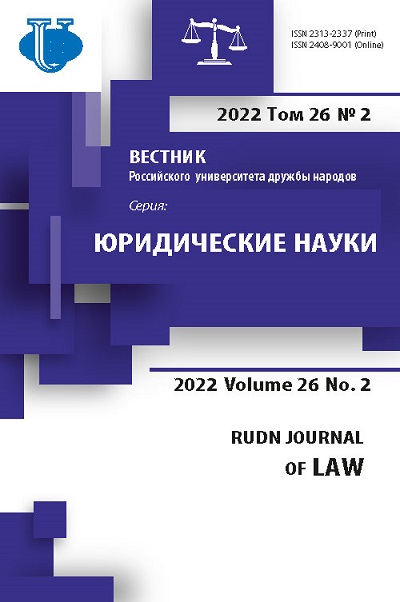Медиативно-восстановительный подход в разрешении уголовно-правовых конфликтов
- Авторы: Сенина Е.Н.1
-
Учреждения:
- Институт медиации Российской академии адвокатуры и нотариата
- Выпуск: Том 26, № 2 (2022)
- Страницы: 464-484
- Раздел: ПРОЦЕССУАЛЬНОЕ ПРАВО. ПРОКУРОРСКИЙ НАДЗОР
- URL: https://journals.rudn.ru/law/article/view/31095
- DOI: https://doi.org/10.22363/2313-2337-2022-26-2-464-484
- ID: 31095
Цитировать
Полный текст
Аннотация
Ряд международно-правовых документов настоятельно рекомендуют модернизировать национальную систему разрешения уголовно-правовых конфликтов с учетом важности осуществления не только традиционных запретительно-карательных и превентивных, но, в первую очередь, восстановительных задач. Такая модернизация, предполагающая переход от стратегии «борьбы с преступностью» к стратегии «сокращения вреда от преступности», требует сочетания методов «карательного» и «восстановительного правосудия» в целях наиболее результативного решения задач возмещения причиненного потерпевшему вреда и восстановления его нормальной жизнедеятельности, восстановления нарушенного общественного порядка, а также исправления и ресоциализации лица, совершившего преступление, во избежание повторности преступной деятельности. Но для того, чтобы такая трансформация парадигмы уголовно-правовой политики была не искусственно насажденной, а органичной и естественной, необходимо чтобы в российских реалиях сложились определенные социально-политические и правовые факторы, обусловливающие становление и развитие медиации и других программ восстановительного правосудия в области уголовного права. Впервые в отечественной науке ставится и исследуется проблема социально-правовых закономерностей концепции восстановительного правосудия. Проведенное исследование позволило выявить и сформулировать комплекс закономерностей, характеризующих становление и развитие восстановительного подхода, и на основе выделенных закономерностей оценить текущее состояние его социально-правовых предпосылок в России.
Об авторах
Елена Николаевна Сенина
Институт медиации Российской академии адвокатуры и нотариата
Автор, ответственный за переписку.
Email: eadvocat8@gmail.com
ORCID iD: 0000-0003-0751-8710
адвокат, директор Института медиации
Российская Федерация, 105120, г. Москва, пер. Полуярославский Малый, д. 3/5Список литературы
- Андрианов В.К. Диалектические закономерности и тенденции развития уголовного права // Вестник ДВЮИ МВД России. 2019. № 2 (47). С. 29-37.
- Андрианов В.К., Пудовочкин Ю.Е. Закономерности уголовного права. М.: Юрлитинформ. 2019. 342 c.
- Андрианов В.К., Пудовочкин Ю.Е. Закономерности и тенденции применения уголовно-правовых норм // Государство и право. 2020. № 11. С. 97-105.
- Бабаев М.М., Пудовочкин Ю.Е. Проблемы российской уголовной политики: монография. М.: Проспект, 2014. 296 с.
- Бабаев М.М., Пудовочкин Ю.Е. Российская уголовная политика XXI века. М.: Юрлитинформ, 2020. 200 c.
- Дали К., Иммарижеон Р. Прошлое, настоящее и будущее восстановительного правосудия: некоторые критические размышления / пер. А. Лаптева. Режим доступа: http://sprc.ru/library (дата обращения: 04.09.2021)
- Ефремова Н.Н. Традиция примирения в истории обычного права и законодательства России (дореволюционный период) // Государство и право. 2011. № 7. С. 84-90.
- Гриценко Д., Калугина Е. С. Библейская симфония по книгам Ветхого и Нового Заветам. М: Даръ, 2007. 479 c.
- Арутюнян А.А. Медиация в уголовном процессе. М.: Инфотропик Медиа, 2013. 200 с
- Капинус О.С. Криминализация и декриминализация деяний: поиск оптимального баланса // Общественные науки и современность. 2018. № 4. С. 37-46
- Карнозова Л.М. Уголовная юстиция и гражданское общество. Опыт парадигмального анализа. М.: Р. Валент, 2010. 480 c
- Карнозова Л.М. Мониторинг деятельности территориальных служб примирения за 2018 год, проведенный в рамках Всероссийской ассоциации восстановительной медиации // Вестник восстановительной юстиции. 2019. № 16. С. 86-148
- Келасьев В.Н., Первова И.Л. Самоорганизация общества и механизмы ее активации // Вестник Нижегородского университета им. Н.И. Лобачевского. Серия: Социальные науки. 2014. №3 (55). С. 65-73.
- Коробеев А.И. Уголовно-правовая политика России: от генезиса до кризиса: монография. М.: Юрлитинформ, 2019. 352 c.
- Максудов Р. Восстановительное правосудие // Неволя. 2005. № 4. Режим доступа: http://index.org.ru/nevol/2005-4/maxud_n4.html (дата обращения: 01.09.2021)
- Nugent, W. R., Umbreit, M. S., Wiinamaki, L. & Paddock, J. B. (2000) Participation in Victim-Offender Mediation and Re-Offense: Successful Replications? Journal of Research on Social Work Practice. 1, 5-23. (in English)
- Рагимов И.М. О нравственности наказания. СПб.: «Юридический центр», 2016. 224 c.
- Репицкая А.Л. Современное состояние, структура и тенденции российской преступности // Вестник Омского университета. Серия «Право». 2018. № 1 (54). С. 151-156.
- Сидоренко Э.Л. О статусе потерпевшего в уголовном праве // Журнал российского права. 2011. № 4. С. 77-84.
- Сидоренко Э.Л. Диспозитивность как режим уголовно-правового регулирования: дисс. … д-ра юрид. наук. М., 2013. 418 c
- Сорокин П. Законы развития наказаний с точки зрения психологической теории права Л.И. Петражицкого // Новые идеи в правоведении: Эволюция преступлений и наказания. СПб.: Образование, 1914. Сб. 3. С. 113-151
- Сумачев А.В. Диспозитивность в уголовном праве (теоретико-прикладной анализ): дисс. … д-ра юрид. наук. Екатеринбург, 2006. 346 c
- Umbreit, M. (2021) Restorative Justice. Encyclopedia of Crime and Justice. Available at: https://www.encyclopedia.com/social-sciences-and-law/law/law/restorative-justice [Аccessed 2nd September 2021]
Дополнительные файлы















